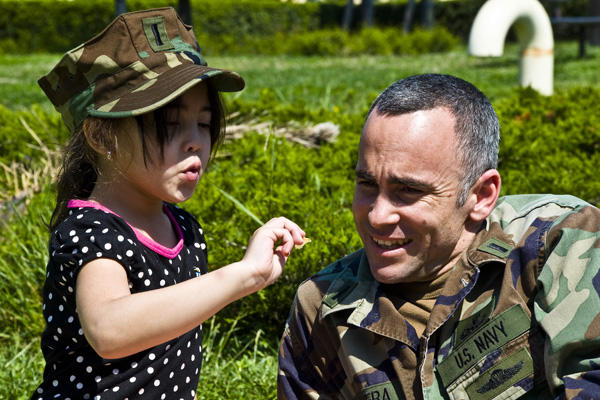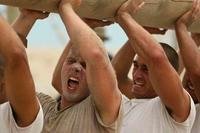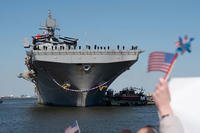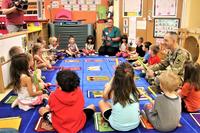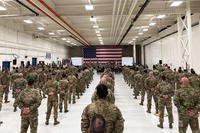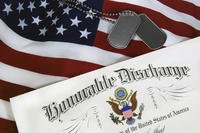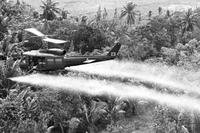In honor of April's Month of the Military Child, I created a Top 10 list of the qualities I most appreciate about children from military families. Their amazing service and sacrifice deserve a much longer list, but I figured this would at least be a start.
The top 10 reasons I appreciate military children:
10. Their sense of humor. Military kids do all they can to keep their spirits up. Some carry life-sized cardboard posters of parents called "Flat Daddies" and "Flat Mommies" to keep deployed loved ones close at hand. They carry them to pizza parties and movies, sporting events and concerts. During a past deployment, military wife Vivian Greentree's sons took it a step further. They pasted pictures of their deployed dad on a stick, dubbed it a "dad on a stick" and took it everywhere with them. They even asked their "dad" to help them make macaroni and cheese.
9. They selflessly serve their community. Military children possess a strong sense of service — perhaps modeled after their military parents who serve and sacrifice daily. A shining example is last year's Army Military Child of the Year, Amelia McConnell. Soon after her father returned from Iraq in 2006, he was diagnosed with leukemia. After treatment, he redeployed to Iraq in 2007. In 2009, her only brother, Sgt. Andrew McConnell, was killed in Afghanistan. Still, Amelia excelled in school and in sports, and volunteered hundreds of hours a year for a number of organizations. When asked why she does so much, she said, "I always think there are a lot of people in worse situations than I am."
8. They stand by their military parent through thick and thin. I met a high school senior several years ago who told me his father would miss his graduation and his departure to college. But this teen wasn't upset in the least. "He loves to be a soldier, and if it makes him happy, it makes me happy," he said. "How can I possibly complain that he's not watching me graduate when he's out there sacrificing for our nation."
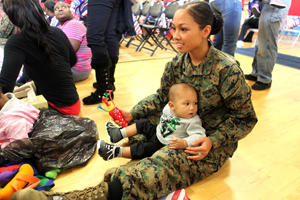
7. Their sense of patriotism. Zachary Laychak was 9 years old when his father was killed Sept. 11, 2001, when American Airlines Flight 77 crashed into the Pentagon. Laychak struggled over the years with anger and confusion over the incident. But as time passed, his initial anger evolved into a deep sense of patriotism. "As terrible as this whole situation was, I know he was a very patriotic person," he said of his father, and that he died serving his country. That's a way he would have been proud to go."
6. They support each other. Several years ago, I met an amazing group of military kids at a camp for children of fallen service members hosted by the Tragedy Assistance Program for Survivors. Over the course of a long weekend in D.C., the children bonded over their shared experiences, offering hope and support to each other. The camp and fellow survivors give "us a sense of we're not alone in this fight of grieving," said attendee, Ben Suplee, whose father, Sgt. 1st Class Daniel A. Suplee, died while serving in Afghanistan.
5. Their adaptability. Military children change school systems six to nine times on average. Felicity and Abigail Horan, twin daughters of Army Lt. Col. Dave Horan, described their experiences as military kids at a "Joining Forces" event last year. Now in the seventh grade, the girls are attending their fifth school after eight military moves. They spoke of "always saying goodbye" to friends and that their father missed five of their birthdays. But, Felicity said, "Don't feel sorry for us…. We are stronger because of our experiences."
4. Their compassion. A number of kids have military parents who return home wounded, some with visible wounds and others with less-evident injuries such as post-traumatic stress disorder or traumatic brain injury. These kids immediately step up to help out at home – taking on additional chores, pitching in to babysit — during their parent's recovery. Army Spc. Kevin Wear, father of five, suffered a traumatic brain injury and leg injury in Afghanistan when a roadside bomb blew up the vehicle he was riding in. He often struggles to remember dates and words, but his kids don't see him any differently. "All five of my kids believe I'm Superman – the toughest, strongest guy in the world," he said.
3. Their global knowledge. Many military kids have traveled across the nation and around the world. They have an innate appreciation for cultural diversity and knowledge of world events that most kids who never crossed state lines would be hard-pressed to match. At a Joining Forces event last year, Army Chief of Staff Gen. Raymond T. Odierno said he understands the challenges faced by military families — he moved his wife and children 24 times during his 36-year military career. Today, the general said, his children are successful adults in large part because of their military upbringing, the resilience it adds, and the teachers who took an interest in them.
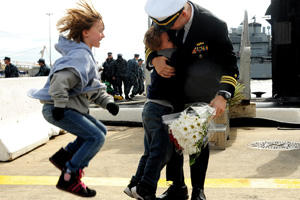
2. Their strength. They've dealt with a decade of war and multiple deployments, with the associated worry and fear. But these challenges also have equipped them with a resilience that will prepare them for life's setbacks and hardships. Nicole Marie Daly, the Army's 2013 Child of the Year, has moved nine times and has attended three high schools so far. Growing up in a military family "created resiliency because every time we move, I have to constantly prove myself as an individual and my capabilities," Nicole said.
1. They serve too. Their military parent signed on the dotted line; their children did not. Yet, they must deal with deployments, frequent moves and school transitions, and they do so with courage and grace. As a nation, we owe them a debt of gratitude, First Lady Michelle Obama told a group of high school girls last April. "Ultimately, you understand that your parents are part of something far bigger than themselves," she said. "By working so hard …, you give your parents the peace of mind they need to focus on their mission. With your service, you make their service possible. And for that, we can't thank you enough."
———-
Disclaimer: The appearance of hyperlinks does not constitute endorsement by the Department of Defense of this website or the information, products or services contained therein. For other than authorized activities such as military exchanges and Morale, Welfare and Recreation sites, the Department of Defense does not exercise any editorial control over the information you may find at these locations. Such links are provided consistent with the stated purpose of this DoD website.
